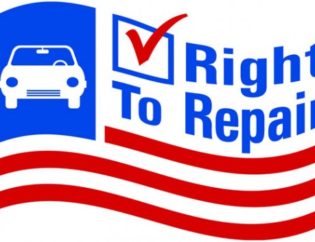
Wasn’t the Vehicle Data Issue Already Resolved a Few Years Ago?
Yes, it was, but that victory was short-lived, and we’ll explain why. As far as most people know, they’ve always been able to take their cars to any aftermarket repair shop for maintenance or larger repairs. What they don’t realize is that that right has been hard-fought for since the inception of the automotive industry. In the early days, OEMs used to try to force consumers into dealer aftercare with a claim that the aftermarket didn’t have the right tools to do the work properly. Then as vehicle electronics evolved and engine control units became commonplace, OEMs tried to block the aftermarket from accessing vehicle data through the onboard diagnostic ports, also known as OBD/OBD-II. Their attempts were halted with the passing of Massachusetts’ pioneering 2013 Right to Repair law, which was supposed to enshrine the aftermarket installer’s access to diagnostic data. Unfortunately, when that law was passed no one anticipated that it would be outdated so quickly with the evolution of wireless technology, otherwise known as telematics. So, here we are a mere 7 years later, fighting to eliminate the wireless loophole that telematics has created. Here in 2020 over 90% of new vehicles have the ability to transmit critical diagnostic data wirelessly, so make no mistake – it’s a very big loophole.
Massachusetts 2020 Ballot Question 1 – Right to Repair: What the Opposition Is Saying
The group fighting against the Massachusetts Right to Repair Coalition on behalf of Big Auto, The Coalition for Safe and Secure Data says: “It’s your data, help keep it that way”. But what they really mean is: “It’s your data and we’re the only ones that should continue to have unrestricted access to it.”
Here’s an excerpt taken directly from their website:
“Massachusetts voters will be asked to respond to a ballot question in November 2020 that risks placing personal data in the hands of hackers, criminals and an unlimited number of strangers. At its core, it would allow remote access to driving data systems exposing sensitive, personal data in real-time.”
They go on to share a truly frightening video which depicts an alleged sexual predator successfully gaining access to someone’s home by walking right in through an opening garage door. The video claims that vehicle owners’ addresses could be paired with garage door codes – meaning that anyone with access to the vehicle’s wireless data could use it for nefarious purposes, such as the breaking and entering seen in the video.
After reading their argument against question 1 and watching the video, we’ve got a couple questions. If telematics is so unsecure – potentially putting drivers and their families in grave danger in their own homes, then why is Big Auto using it to transmit sensitive customer data in the first place? Is preventing aftermarket access to that data going to somehow make it more secure or prevent it from falling into the hands of criminals?
Something Doesn’t Add Up
Big Auto is protesting the change on the basis of a hypothetical problem, yet their defense is just that – a hypothetical concern about security. The potential security issue didn’t just pop up when the Right to Repair Coalition began to make a little noise. If it exists at all, it’s existed all along and does not change the stance of the aftermarket. A common sense look at their claims and the facts should conjure a couple of thoughts. The first being that sensitive personal data should be secure regardless of whether a dealership or a third party in the aftermarket has access to it. If it’s not, automakers need to work towards making it sufficiently secure while also allowing the aftermarket access to critical repair data. The security issue rests squarely on Big Auto. Not the aftermarket. If there really is a security threat associated with telematics data sharing, it seems unlikely that the threat will go away if question 1 fails to garner enough support at the ballot box. So, what’s their point?
Massachusetts 2020 Ballot Question 1 – Preventing A Dealership Monopoly That Hurts Consumers
As one of the longest standing aftermarket auto parts suppliers in North America, we’re absolutely in favor of updating the 2013 Right to Repair legislation. There is no question that it is needed to ensure a level playing field for the independent aftermarket repair industry. At this time, it is still true that most diagnostic data needed for repairs is available through the OBD-II port as required in the original Right to Repair legislation. But we’d be remiss if we didn’t consider the long history of Big Auto attempting to freeze out the aftermarket – and the likelihood that they will soon begin to do the same with their use of telematics. Voting YES on question 1 this November is about preserving your right to choose who repairs your vehicle. Voting YES on question 1 this November is also about keeping small businesses in business. Without a change to the current law consumers will likely be pushed into more expensive dealer repair options. Nobody wants that and if you’ve ever been shocked at the hourly rate listed on the invoice for repairs at any dealership, you understand why! Without the same access to wireless diagnostic data that dealerships have, aftermarket repair shops won’t have the ability to effectively diagnose problems with your vehicle. If they can’t diagnose whatever the problem may be, they can’t fix it and if they can’t fix late model vehicles their businesses will be greatly harmed. It’s that simple. We need to keep automakers honest by forcing them to share the data. They said it themselves – the consumer owns the data, not them.
VOTE YES ON QUESTION 1 to protect your rights, your bank account, and your favorite aftermarket repair shop.


